Current Location: Home > Media > FAQ > Why GRS Certification Matters in the Artificial Grass Industry?
Why GRS Certification Matters in the Artificial Grass Industry?
2023-09-15 14:06:00In the ever-evolving world of artificial grass, there's one gold standard that stands out, acting as a beacon for quality, trust, and environmental responsibility: GRS Certification. But what exactly is GRS, and why has it become the hallmark of top-tier turf products? We'll delve into the tangible environmental benefits of GRS-certified artificial turf, its role in ensuring product durability, and why it's crucial for cultivating consumer trust. Beyond that, we'll also explore the ethical production practices mandated by GRS, compare GRS-certified turfs with their non-certified counterparts.
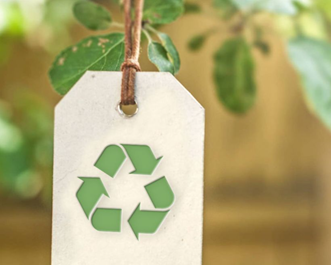
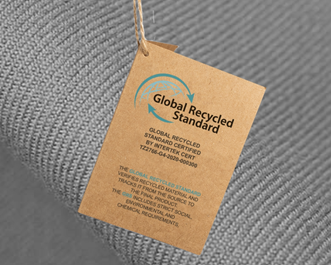
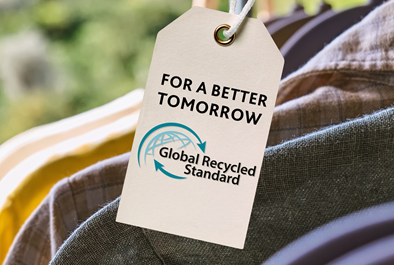
1.GRS Certification: Setting the Bar in Quality Standards
The Global Recycled Standard (GRS) is not just another industry acronym; it's the emblem of quality, a badge of honor that artificial turf products can proudly display. Originally developed for textiles and fashion sectors to validate the recycled content of products, GRS has since expanded its reach, and the artificial turf industry has welcomed it with open arms.
Quality First
GRS Certification is more than just a label. It's a promise. A promise that the turf under your feet has undergone rigorous testing and meets some of the industry’s strictest quality benchmarks. When a product boasts the GRS tag, it means that it has not only met but often exceeded, the standard expectations. From fiber strength to color retention and even resilience against environmental factors, GRS ensures that products stand up to scrutiny.
Beyond the Product: A Holistic Approach
But GRS isn't just about the final product. The certification takes a holistic view of the production process. It assesses the environmental implications of production, the chemicals used, and even the social ramifications, ensuring that workers are treated fairly and ethically. This comprehensive approach means that when consumers see the GRS certification, they can be confident they're supporting a product that's not just top-quality but also produced responsibly.
Setting the Benchmark for the Industry
As the artificial turf industry continues to grow, standards like GRS play a critical role in guiding its trajectory. By setting a high bar for quality and responsibility, GRS pushes manufacturers to innovate, evolve, and consistently deliver their best. It's not just about maintaining an industry standard; it's about elevating the entire industry to new heights.

2.Environmental Benefits of GRS-Certified Artificial Turf
Environmental Stewardship at its Core
At the heart of GRS Certification lies an unwavering commitment to environmental sustainability. When you encounter artificial turf that holds the GRS badge, it's a clear signal that environmental concerns were at the forefront during its production.
Recycling and Resource Management
One of the most prominent aspects of GRS-certified turf is its focus on recycling. These products utilize a significant percentage of recycled materials, thereby reducing the strain on our planet's finite resources. By championing recycled content, GRS certification ensures that waste, which might otherwise find its way to landfills, gets a second life as a quality turf product.
Reduced Chemical Footprint
GRS doesn't just look at the recycled content; it delves deeper into the production process. This certification mandates the use of safer, more environmentally-friendly chemicals during production. This not only reduces the potential harm to our planet but also ensures that the end product is safer for users, be it for residential lawns or public play areas.
Water Conservation and More
Traditional lawns can be water guzzlers, especially in drier climates. GRS-certified artificial turf requires minimal to no water, translating to significant water savings over time. This is particularly crucial in regions where water scarcity is a pressing issue. Moreover, the reduced need for pesticides and fertilizers, often required for natural grass maintenance, means fewer chemicals leaching into the soil and waterways.
A Step Towards a Greener Future
In essence, GRS-certified artificial turf isn't just about presenting a lush, green landscape. It’s about ensuring that the greenery you see is backed by genuine green practices. As consumers become more environmentally conscious, opting for GRS-certified turf is a definitive step towards a sustainable and eco-friendly future.

3.Comparing GRS-Certified and Non-GRS Turfs: What's the Difference?
Understanding the GRS Badge
GRS, or Global Recycled Standard, is not merely an indicator of recycled content but a comprehensive standard that evaluates a product's entire lifecycle. This includes material sourcing, environmental practices, and even the social responsibility of production.
Material Composition: Recycled vs. New
At the core of GRS-certified turfs is the emphasis on utilizing recycled materials. These turfs incorporate a significant amount of post-consumer or post-industrial recycled content. In contrast, non-GRS turfs often use new raw materials, which can strain our planet's resources and contribute to more waste.
Production Practices: The Eco-Friendly Edge
GRS-certified turfs are manufactured with an acute awareness of environmental impact. The certification mandates the use of eco-friendlier chemicals and sustainable practices throughout the production process. Non-GRS turfs, unless they adhere to another eco-certification, may not have such stringent environmental safeguards in place.
Social Responsibility: Beyond the Turf
While the end product is a significant factor, GRS also casts a keen eye on the production process's human aspect. GRS-certified turf manufacturers are required to uphold specific ethical labor practices, ensuring fair treatment of workers. Non-GRS turf production may not necessarily adhere to or be evaluated for such standards, making the GRS badge a sign of both environmental and social responsibility.
Performance and Durability
While both GRS-certified and non-GRS turfs can offer durability, the rigorous testing for GRS certification often means a product that is not just durable but also consistently high in quality. The emphasis on quality materials and production practices can often translate to a longer-lasting and better-performing turf when compared to non-certified counterparts.
The Choice is Clear
In summary, while both GRS-certified and non-GRS turfs can transform spaces into green havens, the former carries with it an assurance of eco-friendliness, ethical production, and quality. For the discerning consumer, understanding these differences can make all the difference in making an informed, responsible choice.
AVG GRS-validated synthetic turf
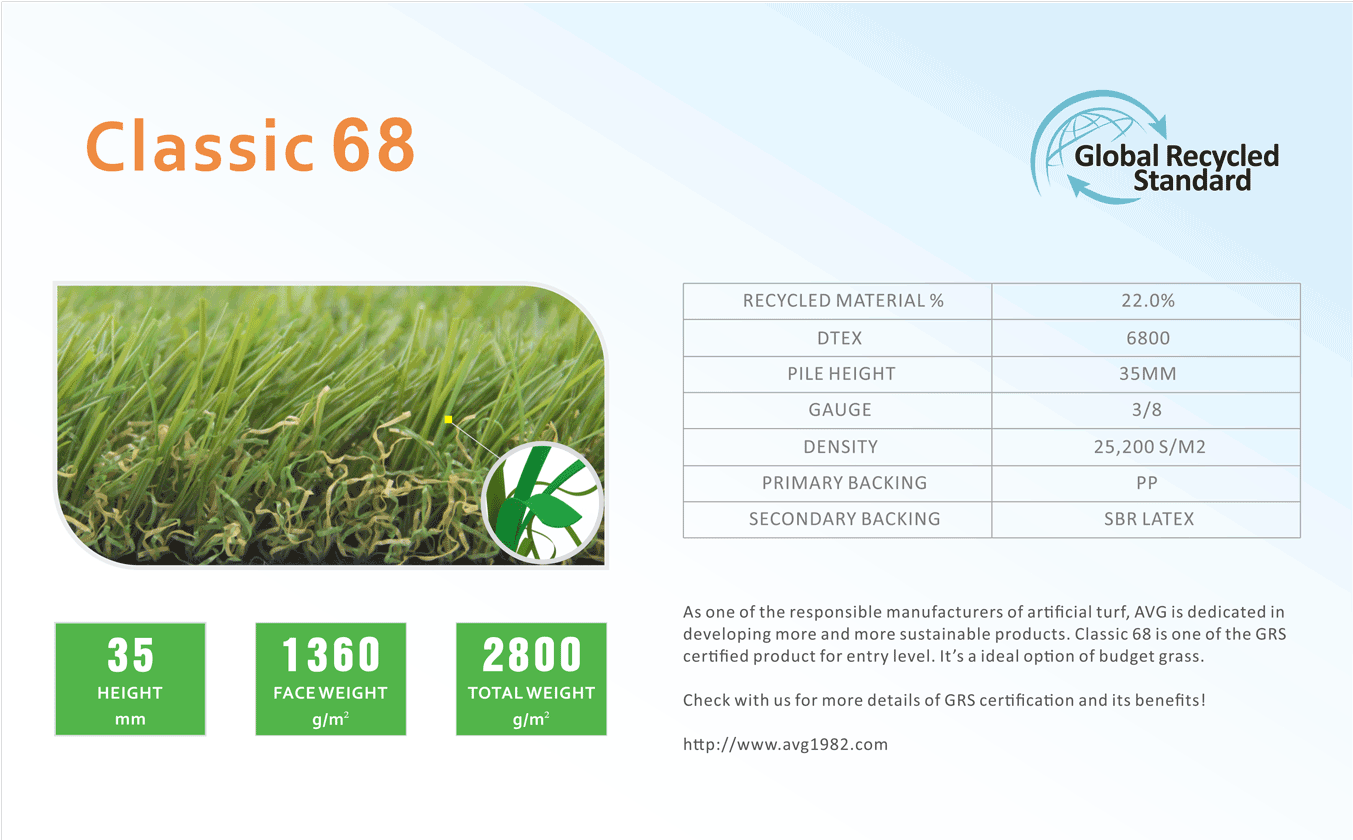
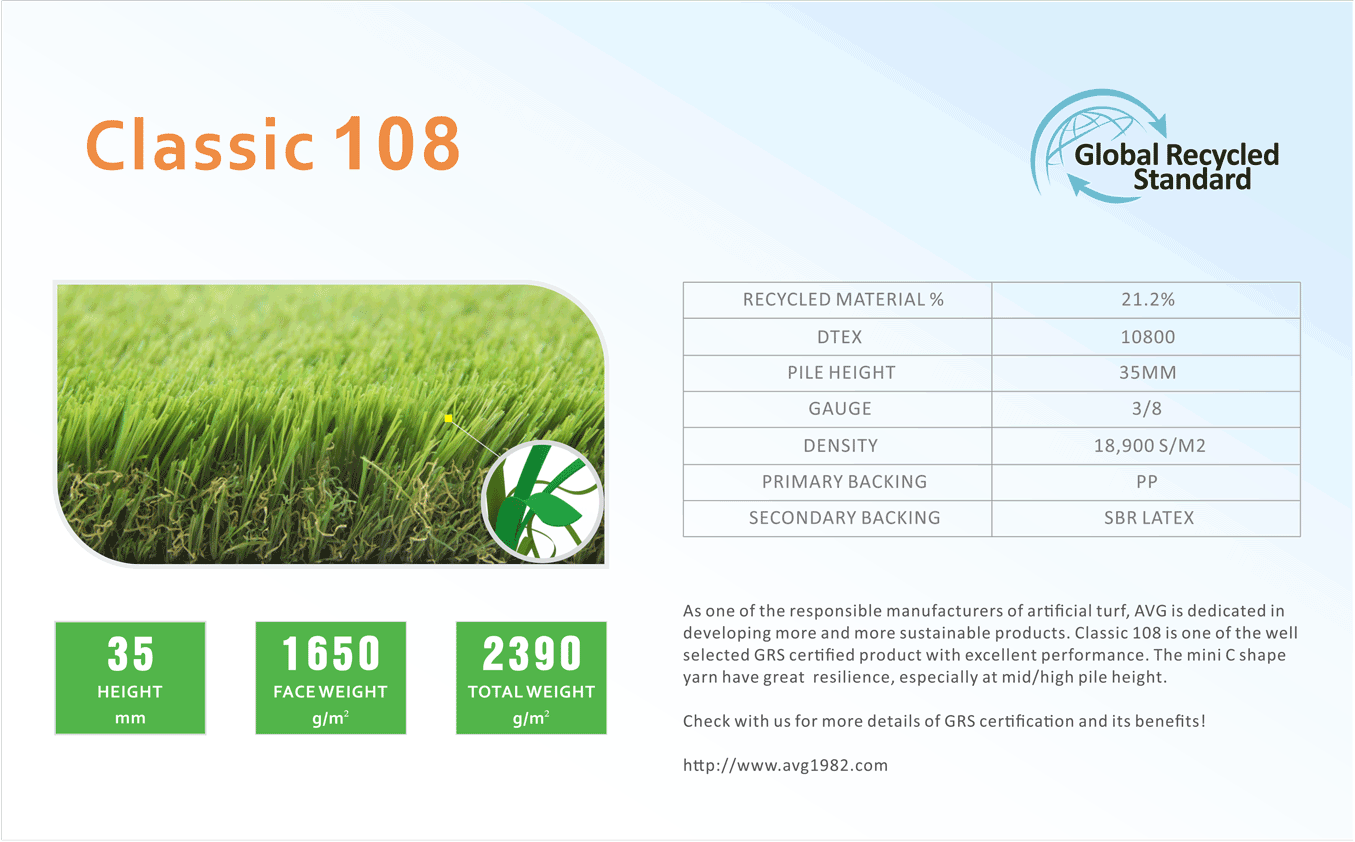
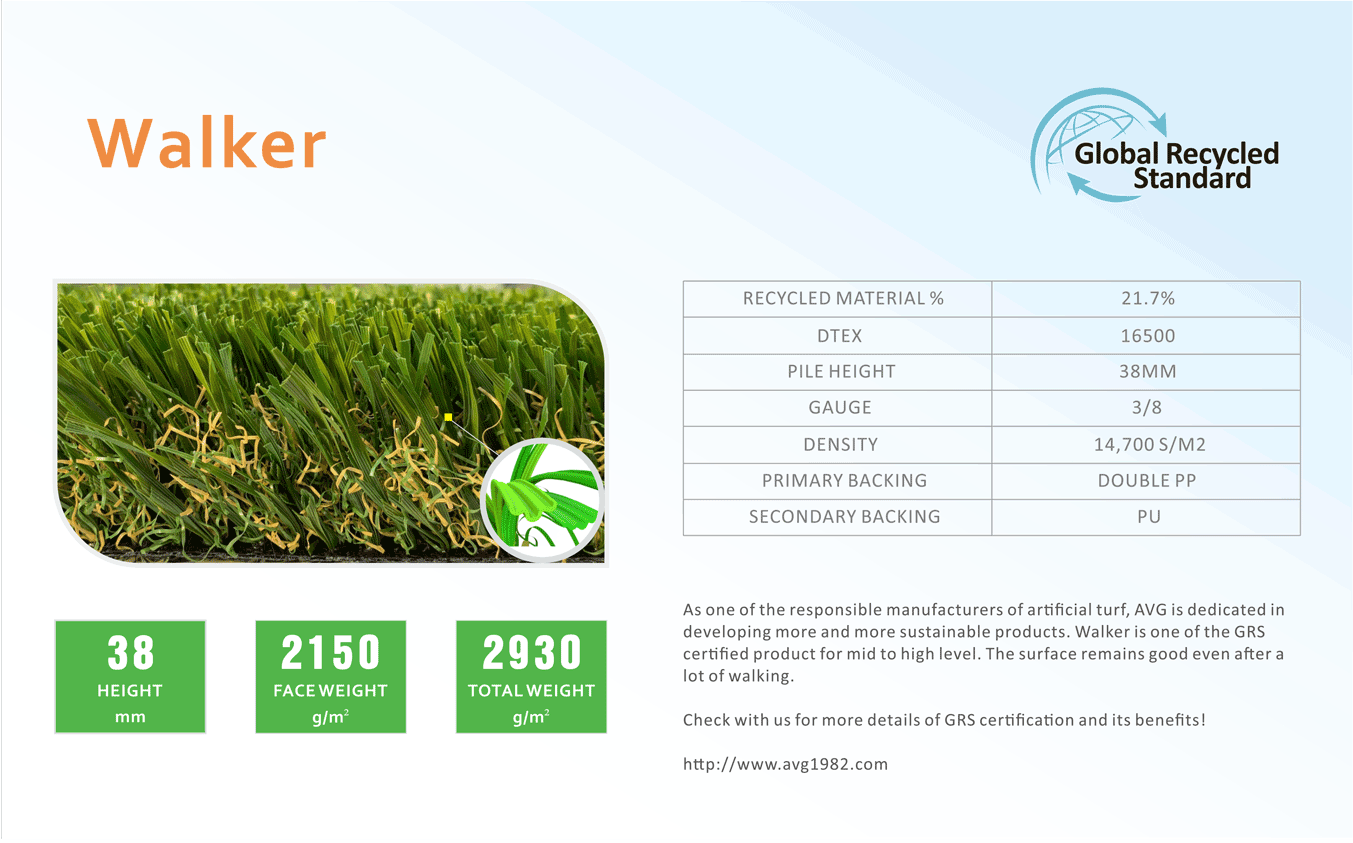
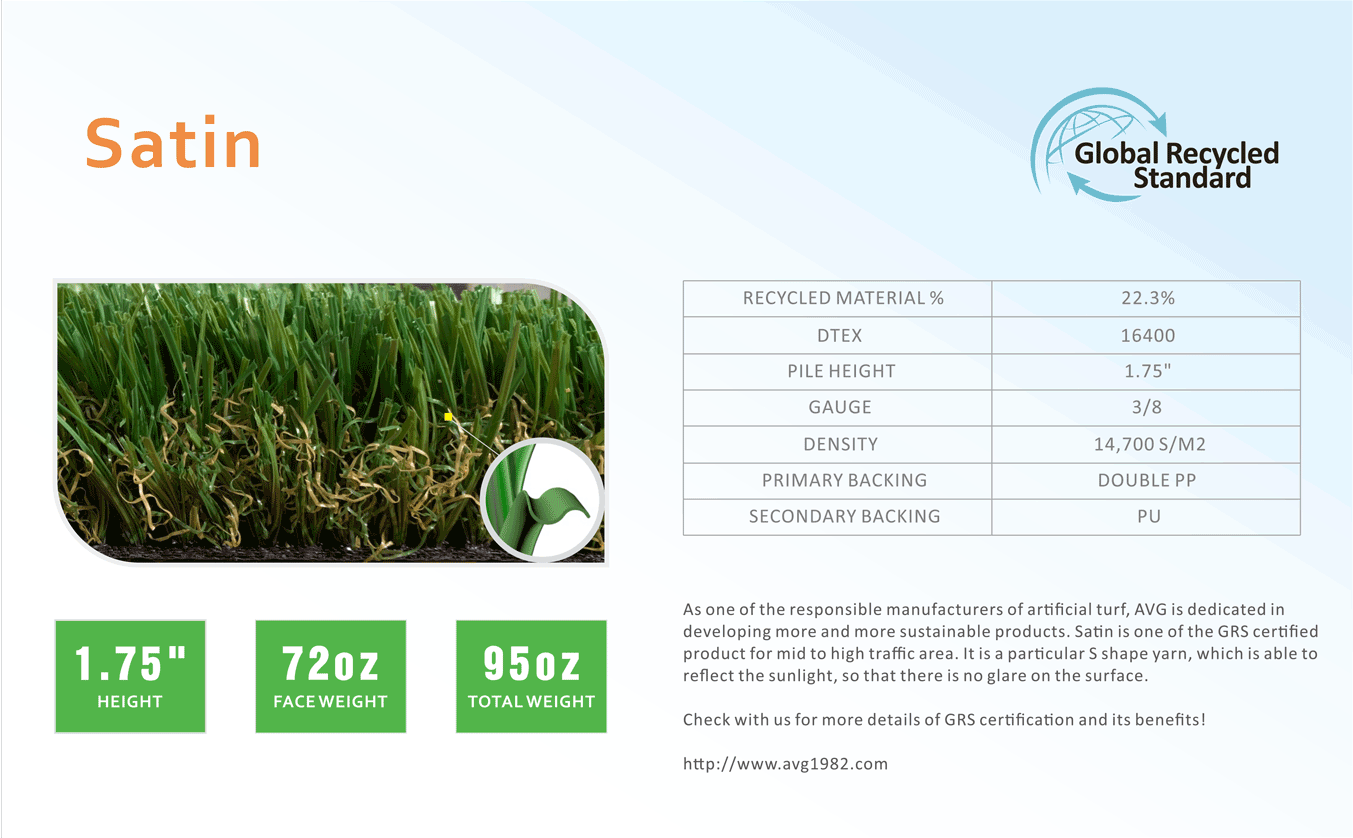
- Wondering How to Keep Your Artificial Grass Lush and Clean?
- Why GRS Certification Matters in the Artificial Grass Industry?
- How Anti-Static Artificial Grass Redefines Outdoor Comfort?
- How long is the life span of synthetic turf ?
- How to choose grass height and density of artificial turf?
- AVG:How to keep our product cost-effective?
- ALL VICTORY GRASS:What is ESTO?
- High Elastic Shockpad Layer






